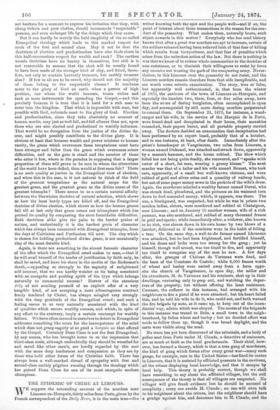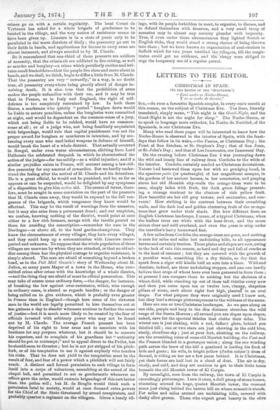THE EPIDEMIC OF CRIME AT LIMOURS.
WE suppose the astounding account of the murders near Limours-en-Hurepaix, thirty miles from Paris, given by the French correspondent of the Daily News, is in the -main true—the
writer knowing both the spot and the people well—and if so, the point of interest about those transactions is the reason for the con- duct of the peasantry. What makes them, naturally brave, such abject cowards in this matter ? Everybody who has read history knows that after a great war murders are apt to increase, certain of the soldiers released having been relieved both of that fear of killing which results from inexperience, and that fear of penalties which arises from the unbroken action of the law. But there is nothing in war that we know of to reduce whole communities to the doctrine of non-resistance, or to diminish their willingness to resist by force any enemies not wearing the garb of the conquering army. Never- theless, in this Limours case the peasantry do not resist, and the Limours murders remain therefore from that side inexplicable, and are worth some minute examination. The story, true or false, but apparently well authenticated, is, that from the winter of 1870, the environs of the town of Limours-en-Hurepaix, and especially the hamlets two, three, four, or five miles away, have been the scene of daring burglaries, often accomplished in open day, and accompanied by still more daring murders perpetrated to conceal them. On September 24, 1870, for instance, a wood- ranger and his wife, in the service of the Marquis de In Ferte, were found dead and decapitated in their house, their movables ransacked, their papers burnt, and all portable property carried away. The doctors decided on examination that decapitation had been performed by an expert hand, probably that of a butcher, and in one instance, at least, after death. Immediately after the priest's housekeeper at Vaugrineuse, two miles from Limours, a woman named Duhamel, was attacked and struck down, apparently by a mason's hammer, and the house robbed. The blow which felled her not being quite deadly, she recovered, and "speaks with terror of a short, fat man, wearing a greasy blouse." The next murder was that of a tailor and his wife named Brunet, who took care, apparently, of a small but well-known chateau, and were robbed of gold and silver coins and a quantity of railway bonds, but not of some paper money sewn in the pockets of the wife's dress. Again, the murderers selected a wealthy farmer named Duval, who was struck dead, plundered, and the pictures on his wainscot torn down to find concealed money, which, it appears, was there. The son, a blackguard, was suspected, but while he was in prison two maiden ladies, sisters, were murdered and robbed at Chataignes, near Limours ; and on January 10 another woman, wife of a rich peasant, was also murdered, and robbed of many thousand francs in gold and specie; while immediately after, a widower, also known to he rich, was cloven down in his own house by two blows of a hatchet, delivered as if the murderer were in the habit of felling a tree. On the same day, a well-to-do farmer named Lheureux was attacked, but he had been frightened, and fortified himself, and his doors and locks were too strong for the gang ; yet he himself, though well armed, was too timid to fire, and apparently too timid to recognise any of the men he saw. A few days after, the granges of Chateau de Verteaux were fired, and the barn of the Comtease de Castrie; while 6,000 francs worth of wheat and barley were carted away from a farm oppo- site the church of Vaugrineuse, in open day, the miller and his attendants, M. de Verteaux and his retainers, shut up in their dwellings, venturing only to peep out, and watching the depar- ture of the property, but without offering the least resistance. Camasse, the sufferer in this instance, had arranged with his neighbours to fire a pistol if he were attacked; but his heart failed him, and he told his wife to do it, who could not, and both warned the fire brigade by note, as it came up, to keep out of the incen- diaries' way, advice which was obeyed. The course of the brigands in this instance was traced to Briis, a small town in the neigh- bourhood, by fallen wheat and barley ; but no decided effort was made to follow them up, though it was broad daylight, and the carts were visible along the road.
No trace has yet been discovered of the criminals, and a body of police sent from Paris under M. Claude, a detective of eminence, are as much at fault as the local gendarmerie. Their chief, how- ever, has formed a theory, which is that a true gang of murderers, the kind of gang which forms after every great war—many such gangs, for example, rose in the United States—has fixed its centre in Limours, that it is assisted by affiliated peasants in the environs, all the crimes displaying local knowledge, and that it escapes by local help. This theory is probably correct, though we shall have something to say about the affiliated villager, but the evil consequence of the theory is that all villagers are suspected. No villager will give frank evidence lest he should be accused of complicity ; every one avoids M. Claude ; no one will even talk to his neighbour about the crimes, lest the neighbour should have a grudge against him, and denounce him to M. Claude, and the
crimes go on with a certain regularity. The local Count de Verteaux has asked for a whole brigade of gendarmes to be located in the village, and the very notion of resistance seems to have been given up. Limours is in a state of panic only to be paralleled in the- worst districts of Sicily ; the peasantry go out to their fields in bands, and applications for licence to carry arms are almost incessant, and always acceded to by M. Claude.
Be it remembered that one-third of these peasants are soldiers of necessity, that the criminals are addicted to fire-raising, as well as murder and burglary—a crime which peculiarly excites and irri- tates small freeholders—that the people live close and move about in bands, and we shall, we think, begin to differ a little from M. Claude. That the peasantry are very " cowardly," in a way, is no doubt true, all peasantry everywhere being greatly afraid of danger in- volving death. It is also. true that the prohibition of arms makes the people unfamiliar with their use, and it may be true that in France, as in Italy and England, the right of self- defence is too completely restrained by law. In both these States, a marksman who quietly " potted " burglars down would be liable to severe penalties, unless the burglaries were committed at night, and would be dependent on the common-sense of a jury, which not being liable to be robbed, wouldl have no common- sense at all ; or of a judge who, not being familiarly acquainted with brigandage, would rule that capital punishment was not the proper award for burglars or murderers in intention, and by sen- tencing every man who used lethal weapons in defence of himself, would break the heart of a whole district. That actually occurred in Bengal, under even worse circumstances, eliciting from Lord Dalhousie the celebrated despatch in which he characterised the action of the judges—far too mildly—as a wilful injustice; and if a similar prejudice exists in France, will account among a law-rid- den peasantry for any amount of cowardice. But we hardly under- stand the feeling after the arrival of M. Claude and his detectives. He is a great official, he would not be punished, and he, so far as appears or can be suspected, would be delighted by any symptoms of a disposition to give him active aid. The source of terror, there- fore, must be sought in some conviction on the part of the peasants that M. Claude once away, they would be exposed to the full ven- geance of the brigands, which vengeance they know would be effectual. This may be the result of warnings from the assassins, but it may also arise from a permanent dread ; and our suspicion, we confess, knowing nothing of the district, would point at once either to a few rich farmers, savage with the insults poured on them for avoiding the conscription—remember the case in the Dordogne—or above all, to the local garde,s-champetres. They know the circumstances of every villager, they hate every villager, and they could keep up a communication with Limours unsus- pected and unknown. To suppose that the whole population of these villages are unaware by whom they are attacked, or that no old sol- dier among them has the physical courage to organise resistance, is simply absurd. The men are afraid of something beyond a broken head, as in the Pall Mall Gazette's story of Wednesday about M. Julien, so many years Mayor of a town in the Meuse, who com- mitted crime after crime with the knowledge of a whole district, —and the thing they are afraid of must be official persecution. This may take of course some ordinary form,—the danger, for instance, of breaking the law against over-resistance, which, wise enough in ordinary cases, is absurd as regards bandits ; or the danger of being called on to give evidence, which is probably even greater in France than in England—though here some of the cleverest men in the world are legally permitted to hire themselves out at ten guineas a day to slander witnesses anxious to further the cause of justice—but it is much more likely to be created by the fear of officials invested with arbitrary power who may not be found out by M. Claude. The average French peasant has been deprived of his right to bear arms and to associate with his brethren for any purpose whatever, lest it should be to censure his superiors, and to complain of his guardians lest " authority should be put in contempt;" and to appeal direct to the Prefet, lest he should seem to threaten ; but he is not yet stripped of his pitch- fork, or of his temptation to use it against anybody who touches his ricks. That he does not yield to the temptation must be the result of fear, and fear of a power which a pitchfork will not fairly reach. A distinct and formal permission to each village to form itself into a corps of volunteers, assembling at the sound of the chapel bell, and permitted to act as gendarmerie whenever an officer gave the order, would restrain brigandage Of this sort better than the police will ; but M. de Broglie would think such a permission fatal to society, would at once demand extra powers for the Chief of the State threatened by armed conspirators, and probably quarter a regiment on the villagers. Given a lonely vil-
lage, with its people forbidden to meet, to organise, to discuss, and to defend themselves with firearms, and a very small troop of assassins may in almost any country plunder with impunity. True, if even under those circumstances they lighted Scotch or English ricks, they would stand a strong chance of being thrown into them ; but we have known an organisation of coal-stealers in Suffolk which for two years terrified the villagers, till the magis- trates could get no evidence, and the clergy were obliged to urge the temporary use of a regular patrol.



































 Previous page
Previous page